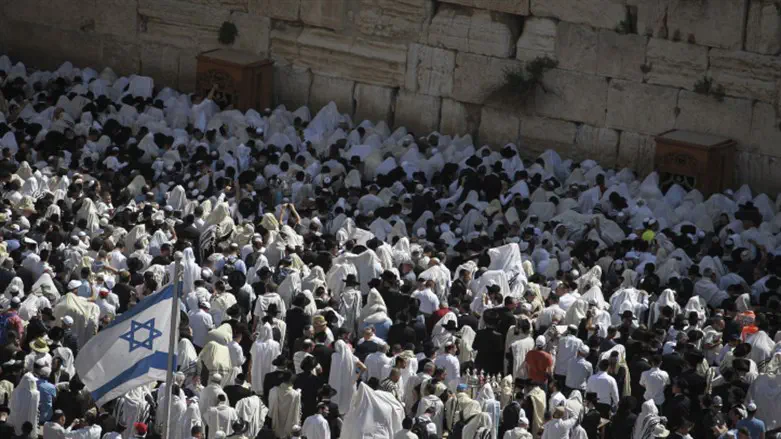
The Rambam writes at the very beginning of the Laws of Fasts that if a great tribulation comes upon the nation, trumpets must be blasted and people must examine their ill deeds to determine what brought on the catastrophe. If they don't repent and consider the tribulation as some coincidental event of nature then this happenstance attitude only invites more troubles.
Today, without prophecy, we cannot be absolutely certain where we angered Hashem. Certainly every individual must examine his or her own deeds and do sincere t'shuva by changing one's ways for the good.
However, when a catastrophe like the current war involves he entire nation then our national situation must be examined. How have we been serving Hashem as a nation and what must be improved? In this regard some Rabbis have focused on a few crucial matters.
Rabbi Tzvi Yisrael Tau, head of the Har HaMor Yeshiva, draws inspiration from Rabbi Kook’s writings on war. He explains that when a new stage of Israel’s Redemption is demanded by the cosmic spiritual workings which guide world development, Hashem often uses war as the force which awakens the Jewish People from a period of stagnation (such clinging to exile in foreign lands) or from a period of excessive preoccupation with the material side of life, a frame of mind which has characterized Israeli society for the last decade.
Rabbi Yosef Carmel, head of the Eretz Chemda Kollel for Dayanut in Jerusalem, cites the lack of unity which preceded the war. Just as Hashem is one, the nation of Israel must be one. We readily see how this war has immediately rectified the division that so fiercely divided the Jewish State throughout the past few years. Today, the entire nation has risen up in a spirit of self-sacrifice clearly showing that in our inner essence the nation in Israel is one.
Rabbi Dov Lior, former Chief Rabbi of the city of Hevron, suggest that the disaster which fell upon Israel on Simchat Torah is because past governments gave parts of the Land of Israel to a foreign regime. In doing so they turned their backs on the gift of the Promised Land which Hashem bequeathed to Avraham and his children after him for all generations. One can readily understand how this ungrateful behavior and betrayal of the Covenant could anger Hashem. Hopefully the aftermath of the war will find all of Gaza under Israeli control and we will have learned the lesson that all of our God-given borders must be kept under Jewish sovereignty as well.
Rabbi Lior explains that in so arrogantly doing what they pleased with Hashem’s gift of the Land of Israel, chopping away pieces to give to an enemy, the leaders of the country acted as if Hashem does not exist and that any Biblical covenant is not binding, Heaven forbid. In the cultural life of the country as well, progressive, liberal, anti-Zionist movements have sought for the past several years to turn the country away from Jewish tradition, turning their back on Hashem in order to ape the immoral lifestyle of the West.
The Torah calls this ungrateful behavior - walking with God in “keri” meaning in a happenstance manner, as if Hashem were no longer the Ruler of the world. In the Torah portion of Behukotay, after citing all of the bountiful blessings the nation in Israel will receive when we follow the Torah, Hashem warns us what will be if we turn away from His commandments and moral teachings:
“If you walk contrary to me and will not listen to Me, I will continue to strike you sevenfold for your sins. And I will let loose the beasts against you which will bereave you of your children and destroy your livestock and make you few in number so that your roads shall be deserted. And if by this disciplining you do not turn back to Me but walk contrary to Me in happenstance (keri) then I also will walk contrary to you and I Myself will strike you sevenfold for your sins. And I will bring a sword upon you which shall execute the vengeance of the Covenant…” (Leviticus, 26: 3-16).
In other words, the nation of Israel is to place the path of Hashem always before it and to always have the Name of Hashem on its lips to declare His Kingship over all of the world. This sanctification of Hashem is our eternal spiritual calling – to be “a kingdom of priests and a holy nation” and not to be a nation like all the rest.
Many great Kabbalists interpret the verses cited above in connection with the Covenant which Hashem made with Avraham where it is clear that the gift of the Holy Land goes hand-in-hand with our safeguarding the holiness of our lives, in our homes and in public gatherings.
As the Rambam makes clear, Israel’s current battle is to be waged in our spiritual and moral lives as well as on the streets of Gaza City. Hashem is demanding a great and sweeping change, both in our personal lives and on a national level – in both spheres we must rise up to our true holy essence, and in that way, lead the world back to the ways of Hashem as set forth in our holy and eternal Torah.
Tzvi Fishman was awarded the Israel Ministry of Education Prize for Jewish Culture and Creativity. Before making Aliyah to Israel in 1984, he was a successful Hollywood screenwriter. He has co-authored 4 books with Rabbi David Samson, based on the teachings of Rabbis A. Y. Kook and T. Y. Kook. His other books include: "The Kuzari For Young Readers" and "Tuvia in the Promised Land". His books are available on Amazon. Recently, he directed the movie, "Stories of Rebbe Nachman."